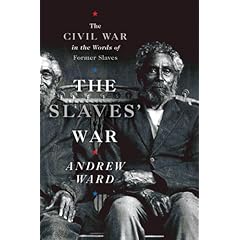Reckoning with the “N” Word
 My latest book, The Slaves’ War, contains many quotations from the Work Progress Administration’s (WPA) interviews with former slaves, in which the word in question appears frequently. Many of the stories they tell are horrifying, and I did nothing to weaken them. But in the end I did bowdlerize their quotations in one respect, and that was by eliminating the “N-word.”
My latest book, The Slaves’ War, contains many quotations from the Work Progress Administration’s (WPA) interviews with former slaves, in which the word in question appears frequently. Many of the stories they tell are horrifying, and I did nothing to weaken them. But in the end I did bowdlerize their quotations in one respect, and that was by eliminating the “N-word.”
The word appears in grim profusion throughout the sources upon which I have drawn. But the following exchange will, I hope, help to demonstrate why I have chosen to eliminate it.
One day a missionary named Lucy Chase rebuked an elderly escaped slave for calling her fellows “niggers.”
“We are niggers,” she protested. “We always was niggers, and we always shall be. Nigger here, and nigger there. Nigger do this, and nigger do that. We’ve got no souls. We’s animals. We’s black, and so is the Evil One.”
“You don’t know that,” said Chase.
“Yes I do,” she replied.
But the Bible doesn’t say that the devil is black, Chase persisted. “Well,” the old woman replied, “white folks say so, and we’s bound to believe them, cause we’s nothing but animals and niggers. Yes, we’s niggers! Niggers! Niggers!”1
The preceding may be more than any historian should have to endure, but it bears witness to the word’s corrosive effect not only on the people to whom it was applied but on the reader as well.
Sparing a reader’s sensibilities is not the entire reason I decided to eliminate it, however. My decision also derived from my frustration in trying to puzzle out its use as recorded by the subjects’ amanuenses. It is often impossible to determine whether a former slave employed the word in its derogatory sense, or whether as a more neutral variation on the word “Negro.” In fact it is sometimes hard to judge whether they employed it at all, or whether it was introduced by their interviewers and their editors as part of their attempt to render all African-American testimony in “Negro Dialect.”
“The situation is always delicate,” wrote an Arkansas interviewer. “Somehow both interviewer and interviewee avoid the ugly word whenever possible. The skillful interviewer can generally manage to pass it by completely, as well as any variant of the word negro. The informant is usually less squeamish. ‘Black folks,’ ‘colored folks,’ ‘black people,’ ‘Master's people,’ ‘us’ are all encountered frequently.”2
Though I retained every subject’s idiomatic grammar and vocabulary, I had already decided to rid my transcriptions of such gratuitous “Darktown” touches as “dem,” “dat,” “whut,” etc. Though eliminating the “N” word as well may to some degree blunt the interviewees’ representations of the acts of verbal and psychological violence that slaves suffered, I found that omitting it removed one more layer of fog, one more level of static, through which we must look and listen to the world of the former slave.
And so, in the name of shedding more light than heat, and in consideration of those readers who cannot read when they see red, I eliminated the “N” word from The Slaves’ War.
1 Lucy Chase in Swift, Dear Ones at Home: Letters from Contraband Camps, p. 189.
2 Irene Robertson in interview with Lou Ferguson of Arkansas in Works Project Administration. Slave Narratives [database on-line]. Provo, UT, USA: The Generations Network, Inc., 2000. Original data: Works Project Administration. Federal Writers Project. Slave Narratives: A Folk History of Slavery in the United States from Interviews with Former Slaves. Washington, D.C.: n.p., n.d.